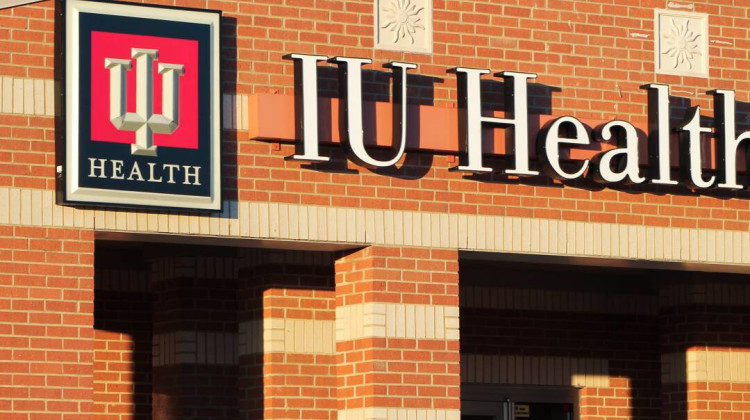
The plan focuses on six key areas, including quality, cost, transparency, access, wellness and competition.
Brandon Smith / IPB NewsRepublican gubernatorial candidate U.S. Sen. Mike Braun (R-Ind.) released a health care plan Thursday that would expand on past legislative action — including some policies that failed during the last few legislative sessions. Braun’s plan includes prior authorization reform, regulations for pharmacy benefits managers and a ban on non-compete clauses, among other things.
The plan was written in coordination with Hoosiers for Opportunity, Prosperity and Enterprise, Inc., a non-profit based in Terre Haute. In a statement, Braun said he partners with HOPE, Inc. to develop policy proposals.
The plan focuses on six key areas, including quality, cost, transparency, access, wellness and competition. The plan published by HOPE, Inc. said it builds on the “firm foundation” set by the General Assembly, but the success of those policies has varied.
New plan, old bills
Braun’s plan positions prior authorization reform as a way to enhance transparency. Prior authorization refers to the process where insurance companies may require pre-approval before they will cover medical services. The practice has been criticized for creating a barrier to care for patients and an administrative burden for providers.
While prior authorization reform was a key part of the Senate GOP’s policy priorities during the last legislative session, Republican lawmakers ultimately killed a reform bill due to "fiscal concerns."
The plan proposes banning non-compete clauses for “licensed medical personnel” in not-for-profit hospitals — which builds on the Federal Trade Commission’s rule that banned them in for-profit settings. The legislature did pass a ban on non-compete clauses in 2023, but only for primary care doctors.
Braun also wants to regulate pharmacy benefits managers, or PBMs.
“In practice, these middlemen between pharmacies and drug manufacturers have only driven up the cost of prescription drugs,” the plan said.
He proposes banning the third party administrators who implement pharmacy benefits for health insurance plans from steering people to pharmacies where the PBM holds equity.
Lawmakers passed a bill last session that added some transparency measures for PBMs, but didn’t add any regulations beyond audits. Attempts to regulate PBMs in 2023 were watered down to “the point of near irrelevance.”
The plan also includes policy changes that would “protect hoosiers from consolidation.” National experts have linked health care consolidation to a lack of competition and higher health care costs in Indiana.
Braun proposes requiring all private equity mergers and acquisitions in the health care industry to be approved by the attorney general.
During the 2024 legislative session, lawmakers passed measures that allow the attorney general to review and request information in cases where at least one party in the merger was valued at $10 million or more. That legislation does not give the attorney general the authority to approve or deny the merger, and does not have any penalty provisions if someone fails to notify the attorney general.
Braun’s plan would require the approval of any merger that involves private equity to receive approval “regardless of their valuation.” He also wants the attorney general to “be empowered” to block certain mergers that are found to cause “adverse impacts for consumers.”
Braun also proposed giving the attorney general’s office the ability to designate law enforcement officers within the Medicaid Fraud Control Unit, which was also the subject of a bill that failed last session.
Several other policies in the plan would also require legislative action.
Medicaid policies, fraud prevention
In addition to advocating for law enforcement officers in the Medicaid Fraud Control Unit, the plan proposes several other policies related to Indiana Medicaid that are meant to lower costs.
The plan calls for an independent audit of Medicaid and the State Employee Health Plan to identify any “unwarranted or inappropriate amounts were paid on claims” and to identify trends within the programs.
Join the conversation and sign up for the Indiana Two-Way. Text "Indiana" to 765-275-1120. Your comments and questions in response to our weekly text help us find the answers you need on Medicaid and other statewide issues.
The plan also said the attorney general’s office should partner with the Family and Social Services Administration and investigate any alleged overpayments, duplicative claims, or other suspicious billing and claim practices detected — “regardless of the monetary value.”
Currently, a “whistleblower” lawsuit is making its way through the courts that alleged several Indiana hospital systems and managed care entities committed “tens, likely hundreds” of millions of dollars of Medicaid fraud.
However, the plan doesn’t just focus on fraud when it comes to Medicaid. It also proposes policies that are aimed at improving the quality of care and increasing access.
Among other things, the plan advocates for expanding telehealth for Medicaid members and setting metrics to measure the quality of care in Indiana's new Pathways for Aging program.
Another policy in the plan would require Medicaid members to consult with a primary care physician before going to the emergency room for a non-emergency, while encouraging private plans to introduce the same requirements.
But, the plan recognizes that would require members to have better access to primary care providers. To expand primary care options for Medicaid members, Braun was to allow patients to “access program dollars to support a direct primary care practice membership.”
He also advocates for setting “clear metrics” to measure quality of care and patient outcomes for the state’s new long-term care program for Medicaid members over the age of 60.
Infant and maternal mortality
Braun’s plan also includes ideas on how to confront that state’s high infant and maternal mortality by increase access to obstetrics services in rural areas.
Indiana has some of the worst infant and maternal mortality rates in the country — and those numbers are even worse among Black Hoosiers and in rural areas.
Braun wants the Indiana Graduate Medicaid Education fund to prioritize rural training placements for obstetrics, or OB, providers and “other high-need positions” to address workforce shortages in rural areas.
He also advocates for establishing new training programs for OB and family medicine OB, as well as midwives. Currently, there is no program in the state that trains midwives.
Abigail is our health reporter. Contact them at aruhman@wboi.org.
 DONATE
DONATE






 Support WFYI. We can't do it without you.
Support WFYI. We can't do it without you.